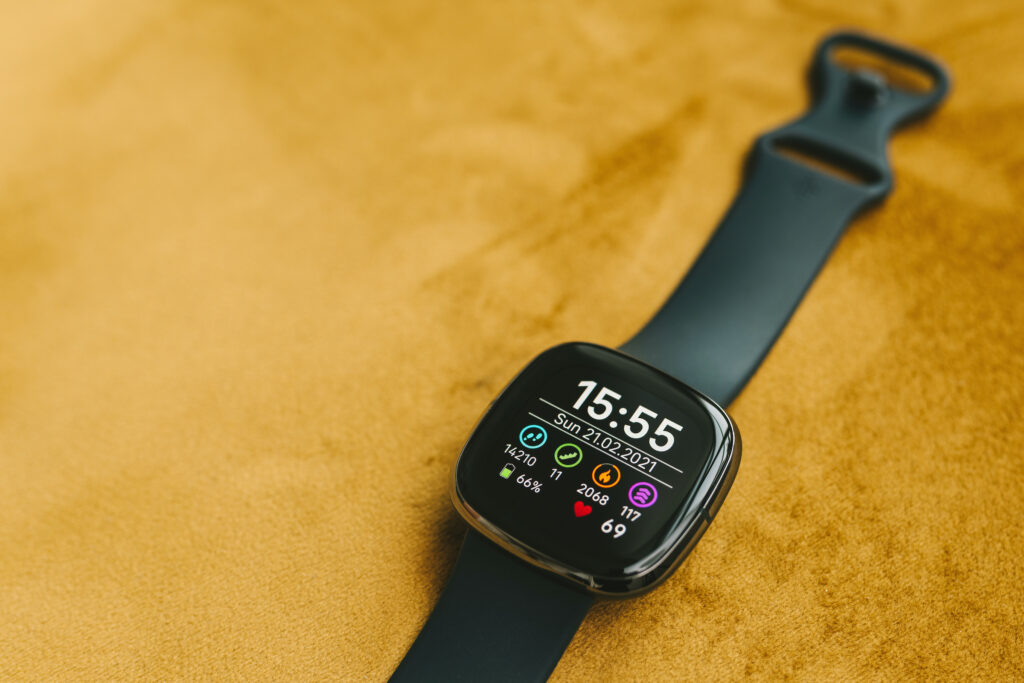Equity in Health Technology: Where is Space for those Living in Larger Bodies?
Equity in Health Technology: Where is Space for those Living in Larger Bodies?
As a body justice advocate, the past two years have involved a plethora of requests regarding my expertise on body image and managing weight during the pandemic. The recurring moral panic over “obesity” was well underway in 2020, as exaggerated reports of people with higher BMIs being more vulnerable to Covid-19 circulated. Additionally, gyms were shutting down in droves due to lockdown protocols and many jobs were transitioning to being remote as a way to stave off the impact of Covid. Many people who may have considered themselves “in shape” or an “ideal” weight had embarked upon uncharted territory in their lives, confronted with bodies that changed in size and mobility. There was also a rise in the use of technology, specifically, health technology. For the sake of this piece, I’m defining health technology as material (i.e., equipment) or scientific knowledge applied to said material with the intention of impacting individuals’ physical, emotional, or mental well-being. For example, during lockdown, there was a rise of online platforms for remote workout classes, wearable technology that counted steps and calories, and newly developed apps looking to cater to individuals’ goals for weight management and nutrition. When reporters interviewed me, they asked over and over: “What can people do to feel better about their bodies?” “What online resources are available to assist them in changing their mindsets?”
What does acceptance look like for those in larger bodies seeking ways to remain active while using health technology?
Given that I am someone who has lived in a fat body my whole life and know all too well the cyclical nature of shame and blame when it comes to attempts in losing weight, the answer was an easy one for me, but arguably a hard pill to swallow for others. Contrary to how dieting and body modifications have been preferred for decades, research on body positivity shows that the secret to enjoying your body was simply to accept it.[1]Marissa Dickins et al., “The Role of the Fatosphere in Fat Adults’ Responses to Obesity Stigma: A Model of Empowerment without a Focus on Weight Loss,” Qualitative Health Research 21, no. 12 … Continue reading But what does acceptance look like for those in larger bodies seeking ways to remain active while using health technology? Could this population confidently rely on health tech to provide the same quality resources for them as it does for their counterparts, not centering weight loss or medical tools like the BMI to properly assess how they could still access movement and have an enjoyable experience?
Unfortunately, the current landscape of health technology is still lacking in accessibility, as many health apps often promote the idea that thinner, abled bodies are healthy ones, and there is an assumption that those who have different abilities or desires for their bodies are not interested in “health.” Essentially, this lack is less to do with access to health technologies and more to do with the incorporation of diverse bodies and abilities into the technology itself.
The Shortcomings of Current Health Technologies
Applying an intersectional approach to health technology that takes account of how barriers are multiplied for people who are mistreated in society due to issues like weight stigma, ableism, and racism is not only morally right, but imperative if one is interested in serving the population writ large. There is a long, documented history of how these biases in healthcare impact patients negatively. For example, one of the most common tools used in healthcare today is the body mass index (BMI), which is calculated by using a formula that divides your weight and height and categorizes you as underweight, normal weight, overweight, or obese based on the final calculation. Despite long-standing criticism for its roots in racism and its lack of actually measuring health, medical professionals still utilize it to determine if someone is eligible for medical procedures and recommendations for lifestyle changes. Additionally, some gyms typically calculate one’s BMI when joining and give a “health” assessment, and BMI is calculated even in the case of someone applying for whole life insurance. For individuals living in a larger body, the BMI can keep them from getting a medical procedure they are desperately in need of or coverage to ensure their family is taken care of in the event they die.
People sought a more holistic approach to wellness that allowed them space to be human and to accept changes had taken place outside of their control that they could learn to be at peace with.
As I pondered the questions reporters from the likes of the New York Times and CNN asked me, one fact stood out: People were exhausted mentally and physically. The emotional toll that the pandemic had taken on individuals was also showing up in their bodies, and people were not looking simply for a quick fix like weight loss, which has been found to not only have a 95 percent failure rate when coupled with dieting,[2]A. Janet Tomiyama, Britt Ahlstrom, and Traci Mann, “Long-term Effects of Dieting: Is Weight Loss Related to Health?” Social and Personality Psychology Compass 7, no. 12 (2013): 861–877. but also introduces the likelihood of additional weight gain. Instead, people sought a more holistic approach to wellness that allowed them space to be human and to accept changes that had taken place outside of their control that they could learn to be at peace with.
From 2020 to the present day, the fear of weight gain has played out in real time across social media, with many brands like Weight Watchers and Noom who market weight loss as the answer to all of life’s problems (i.e., life satisfaction, freedom, dating, etc.) watching. What has happened since is a shift by weight loss companies to remain current and popular by introducing new products with a wellness twist, new workout routines, and new services, all ultimately pushing back against weight gain (i.e., “the quarantine 15”), perpetuating the idea that body acceptance is not enough. However, the silver lining to this story is that there had been a storm brewing for quite some time thanks to the amplification of fat activism (now usurped by what we know as “body positivity”), promulgating the power of body diversity and acceptance.
Where Fat Activism and Health Tech Meet
Before the pandemic and during times when people could not shop in-store or access facilities in person, fat activists were raising concerns about accessibility to ensure that they and others who faced issues around access would not be deprived of the resources that they needed. Consequently, this also puts health technology at center stage, requiring companies to not just think of wellness through the perspective of weight loss but also other factors that contribute to the quality of life.
Furthermore, understanding how and why those who live in larger bodies want to access health technology (especially beyond weight loss) is important since many members of marginalized populations face problems daily that could be mitigated by having access to technology that could assist in their mental, emotional, and physical well-being.

Access is further complicated by issues of cost, as technologies like smartwatches are not compatible with the average consumer’s pocketbook. Moreover, the verdict is still out on what some of the data collected on said devices do as, for example, steps have not been correlated with better health outcomes. It is almost as though creators of health technology did not consult with members outside of dominant communities to find what mattered most to them, but rather deferred to what is typically regurgitated in mainstream media. It is hard to deny and is evident in the ways that much of “health” technology is drafted. Where is the setting that allows calorie counting to be disabled for those who may have suffered from eating disorders? Is there a way to make sure that activity is accurately captured for someone who participates in body movement in a wheelchair?
So, what type of health technologies could aid in creating a more holistic picture of health? Apps like Jabbie (of which I am a cofounder) that promote inclusivity of identities and movement in any capacity are a great start! With Jabbie, it was important to show that health technology could be used in so many other ways to promote health holistically outside of a typical weight loss tool. Additionally, VR programs like Supernatural, available on Oculus’ Quest 2 headset, allow users to set guidelines for movement and offer levels of intensity without skimping on quality, offering less vigorous options for movement under the assumption that those who live in larger bodies can or want to do less. Online platforms like Joyn can be a great resource when seeking out how to incorporate joyful movement into one’s routines. Utilizing resources provided via Fitness 4 All Bodies and Decolonizing Fitness can be monumental in educating companies on trauma-informed movement as well as activity that decenters able-bodied, cisgendered individuals.
The reporters who reached out to me amid the pandemic did so because they were looking for empathetic consideration to a crafted problem in society that we all need relief from. They needed education from a researcher on the topics of body acceptance, image, and the impact of societal stigmas on the issue of weight that really wasn’t an issue at all. The unspoken problem they wanted to tackle was the feelings of shame and defeat many were experiencing, because their bodies were doing something they naturally do. Change. Imagine if we could look to create technology that gets at the heart of that problem? That would be something we could all benefit from. For now, it would be great to have tools that include the many lived experiences of those still looking to monitor their health regardless of their body size, gender, or abilities.
Footnotes
| ↑1 | Marissa Dickins et al., “The Role of the Fatosphere in Fat Adults’ Responses to Obesity Stigma: A Model of Empowerment without a Focus on Weight Loss,” Qualitative Health Research 21, no. 12 (2011). |
|---|---|
| ↑2 | A. Janet Tomiyama, Britt Ahlstrom, and Traci Mann, “Long-term Effects of Dieting: Is Weight Loss Related to Health?” Social and Personality Psychology Compass 7, no. 12 (2013): 861–877. |
